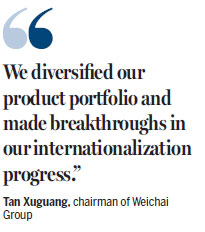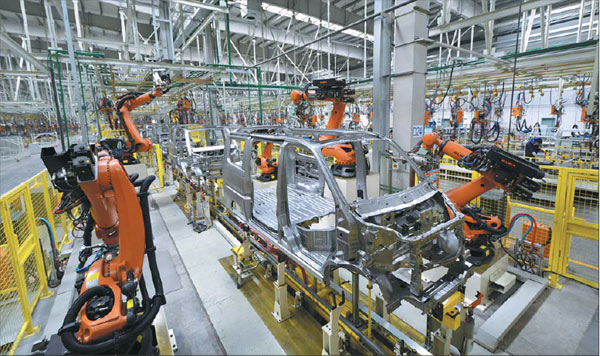Manufacturers lead upgrade and transformation agenda
Zone's development plans put into action by the businesses that call it home, Tang Zhihao reports.
Manufacturers in the Weifang Hi-tech Industrial Development Zone are pushing forward its industrial upgrade and transformation plan in response to the central government's efforts to replace old growth drivers with new ones.
Weichai's approach
Weichai Group, one of the largest vehicle parts and engine developers in China, has been committed to promoting innovation, supporting industrial integration and gathering global resources to build up its core competitiveness.
The company invested heavily in developing engine reliability and core technologies to serve clients' evolving demands over the past few years.
Figures provided by Weichai show that more than 5 percent of its annual sales revenue has been invested in research and development. Total investment in core technologies and reliability enhancement has reached 15 billion yuan ($2.21 billion) over the past 10 years.
The number of engineers in the company's R&D department has increased to more than 3,000, from just 60 people.

Weichai Group, founded in 1946, has registered 2,633 patents, including 469 invention patents, over the past seven decades.
The company's engine sales volume reached 300,000 units in the first half of 2017, an increase of 50 percent year-on-year.
"Weichai has reported rapid growth over the past decade. Our annual sales revenue exceeds 100 billion yuan. We diversified our product portfolio and made breakthroughs in our internationalization progress," said Tan Xuguang, chairman of Weichai. "Weichai's every success was supported by technological innovation."
In the era of smart manufacturing, Weichai also vowed to accelerate its infrastructure and management system upgrade to maintain long-term growth. It has joined the first group of smart manufacturing demonstration businesses in China.
Integrating global resources
Apart from strengthening commitment in independent R&D, Weichai is keen to create partnerships with the world's top technology solution providers to keep it one step ahead of the competition.
In 2009, Weichai Power, one of the subsidiaries of Weichai Group, acquired French marine engine developer and producer Moteurs Baudouin.
Moteurs Baudouin successfully distributed its engine systems in the North American market with support from Weichai.
In 2012, Weichai Power purchased a 25 percent stake in Germany's forklift maker Kion for 467 million euros ($534 million) and a 70 percent controlling stake in Kion's subsidiary Linde Hydraulics for 271 million euros.
The deal allows Weichai to be a leader in the hydraulics industry and strongly support China's machinery industry's upgrade and transformation.
In the same year, Weichai purchased a majority stake in Italian yacht-maker Ferretti to tap into luxury yacht businesses.
All Weichai's overseas projects reported positive net profit in 2016. The overall net profit was four times that of 2015.
This positive investment return strongly supports Weichai's confidence in global expansion and acquisition.
Weichai America, a wholly owned subsidiary of Weichai Power, decided to invest $60 million in leading alternative-fuel power system developer Power Solutions International in March this year. Weichai became PSI's largest shareholder. The deal marked Weichai's debut in the North American power market.
Foton's efforts
Strategies to replace manpower with machines have been enforced by the Foton Shandong Multifunction Plant in the high-tech zone to support its long-term growth.
A manufacturing execution system was introduced to support Foton's smart production in September 2016.
Yin Baoyin, who once worked in the order-sorting department of Foton's Weifang plant, said that the new system can sort orders much more accurately and effectively than human beings.
"The system will prepare all order-related data and sort orders automatically," said Yin. "The order sorting time has been reduced from 2 hours to only 40 minutes."
Smart technologies have been used in processes such as painting, welding and gluing at Foton's plant over the past two years.
The figures provided by the company show that the first-time pass rate of products from assembly lines increased by more than 60 percent compared with previous years.
Foton said that technologies have helped the company to reduce production costs by 41.83 million yuan in 2015 and 2016. The number of employees on Foton's production lines dropped from 2,433 in 2015 to 2,281 in 2016.
The employees who left their positions were re-trained and acquired new skills to support the company's growth in other job positions, according to the company. For instance, Yin is now responsible for monitoring production statuses on the site.
Contact the writer at tangzhihao@chinadaily.com.cn
|
Fully automated robots weld the bodies of automobiles in a workshop in the Foton Shandong Multifunction Plant in the Weifang Hi-tech Industrial Development Zone.Photos Provided To China Daily |
(China Daily 07/10/2017 page12)









